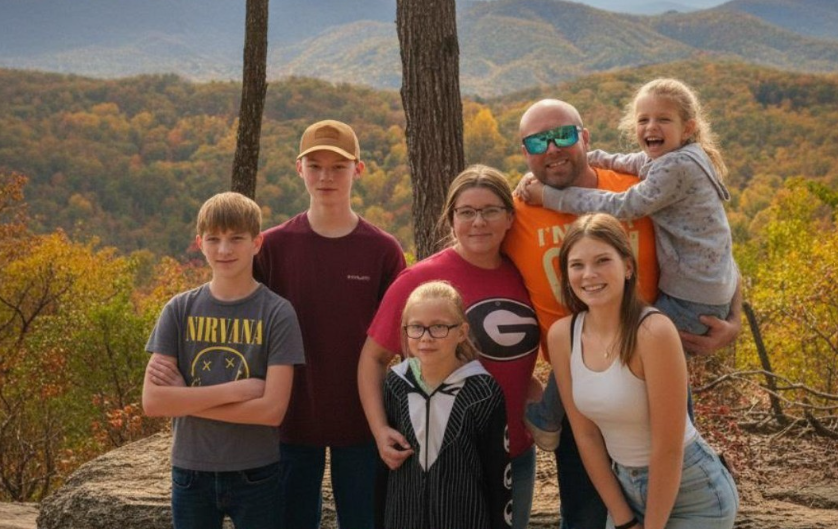What was meant to be a carefree Caribbean getaway for a Florida family has instead spiraled into a nightmarish ordeal. At the heart of the story is 18-year-old Anna Kepner, a bright, driven cheerleader whose death aboard the Carnival Horizon stunned the nation. What began as a heartbreaking tragedy is now taking a darker turn, with newly filed court documents suggesting that the incident may involve someone within Anna’s own family—a revelation that has only deepened the mystery and shaken the fragile sense of normalcy her loved ones were clinging to.
Anna had boarded the Carnival Horizon with her father, stepmother, and a group of younger step-siblings, looking forward to rare, uninterrupted family time. Friends recall her excitement: a bit of sun, a break from school, and the chance to savor the final months of her freedom before the next chapter of her life. She had been preparing to enlist in the military, a choice that surprised some but fit perfectly with her ambitious, disciplined nature. A straight-A student and natural leader on her cheer squad, Anna had a knack for turning ordinary moments into lasting memories. To her friends and family, she was “Anna Banana”—the girl with the easy laugh and a bright future ahead.
Everything changed on November 7, 2025.
That morning, as the Carnival Horizon made its way toward Miami, a crew member entered Anna’s cabin after repeated knocks went unanswered. What they found was shocking: Anna’s body was hidden beneath one of the beds. The grim discovery prompted an immediate alert to federal authorities. None of the passengers, not even her family, were prepared for the devastation that followed. By the following day, all members of Anna’s family had been removed from the ship for questioning. Their phones were seized, statements recorded, and then… silence.
The family was left in limbo—without answers, without explanations, and without clarity about what happened in the critical hours before Anna’s death.
Then came a new development that shattered the uneasy quiet.
On November 8, amid ongoing divorce proceedings with Anna’s father, Chris Kepner, her stepmother, Shauntel Hudson, filed an emergency motion in Brevard County Court. The filing revealed that the FBI had contacted her directly, informing her that one of her minor children—one of the step-siblings on the cruise—was now part of an active federal criminal investigation related to Anna’s death. According to Shauntel, agents warned her that charges could be forthcoming.
Her request was straightforward: more time to respond to the divorce case because she was dealing with an “extremely sensitive and severe circumstance” tied to a federal investigation involving her child. The implication was staggering. What had been assumed to be a tragic accident on the Carnival Horizon might not have been random or isolated. Someone within Anna’s own traveling party could have been involved—a scenario neither side of the family was prepared to consider.
As the story drew national attention, speculation ran rampant. But investigators are approaching the case methodically. Federal authorities are meticulously reconstructing Anna’s last known hours, reviewing hundreds of hours of CCTV footage from hallways, stairwells, and public spaces around her cabin. They are analyzing key-card logs to track entries and exits, interviewing passengers who may have seen or heard something crucial, and investigating Anna’s digital life—texts, calls, social media posts, and other digital traces left behind in her final hours.
Carnival Cruise Line has stated that it is fully cooperating. Yet no level of cooperation can ease the heavy emotional toll on Anna’s family. Chris Kepner has spoken publicly about his frustration, describing the uncertainty as unbearable. His family was removed from the ship, questioned extensively, and then sent home with no insight into investigators’ conclusions. Since then, updates have been scarce, leaving them in agonizing suspense.
The situation is further complicated by existing family tensions: Chris and Shauntel are in the midst of a divorce. Now, with the FBI reportedly scrutinizing one of Shauntel’s children, the pressure on the family has only intensified. Grief, fear, and suspicion now coexist in a household that should have been mourning together.
Friends and extended family are focusing on preserving Anna’s memory rather than the circumstances of her death. They describe her as bright, kind, fiercely loyal, and deeply caring. She loved the water, cherished her friends and family, and was determined to serve her country—a life cut tragically short.
Those who loved her want to remember Anna for her courage, laughter, and ambition—not the way she died.
Yet, until investigators reveal their findings, Anna’s story remains suspended in uncertainty. A minor in her family may be implicated. A divorce proceeding is entangled with a federal investigation. And the public continues to watch a tragedy unfold, desperate for clarity.
Questions remain: Who was with Anna before she disappeared? Did anyone enter her cabin without permission? What does the physical evidence indicate? Was it a crime, an accident, or something more complicated? Answers will come eventually, but until then, tension and speculation grow.
For now, only one question remains: what truly happened aboard the Carnival Horizon?
Someone knows. Someone was there. And in time, the truth will emerge—through a federal indictment, an official report, or a confession. Until then, all anyone can do is wait, grieve, and hope that justice—whatever form it takes—is served.
